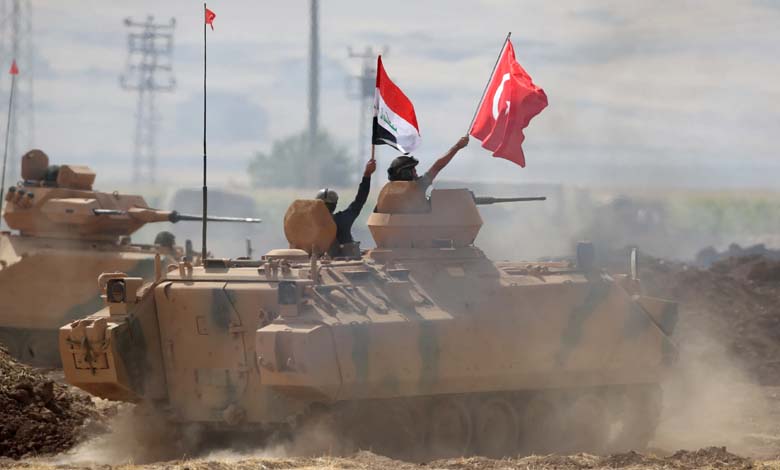Turkey extends its military presence in Iraq, Syria, and Lebanon

Ankara is using a security pretext to confront broader challenges, including redrawing zones of influence in northern Iraq and Syria, counterbalancing Iran’s regional role, and maintaining its place within the regional sphere of influence, particularly in the Mediterranean.
-
Accused of Attempting to Target Sisi’s Aircraft… Turkey Deports Muslim Brotherhood Member Mohamed Abdelhafiz
-
Turkey avoids clash with Israel in Syria: condemnation and mediation, but no concrete action
On Tuesday, the Turkish presidency submitted a memorandum to Parliament requesting the extension of the Turkish army’s missions in Iraq, Syria, and Lebanon for new periods—a move reflecting Ankara’s determination to continue its security and military strategy beyond its borders, despite ongoing domestic and regional controversy.
Regarding Lebanon, Turkey’s presence there does not constitute an independent military mission as in Iraq or Syria. Instead, it falls within its participation in the United Nations Interim Force in Lebanon (UNIFIL), deployed in southern Lebanon since 1978. Turkey contributes a limited number of soldiers and military engineers to this international force, operating under the UN Security Council’s mandate to help maintain stability along the Lebanese-Israeli border and to provide humanitarian and logistical assistance to local communities.
-
Turkey: Disarming the PKK Is a Chance for a Terror-Free Future
-
New U.S. Plan to Fund the SDF Signals Rising Tensions with Turkey
Therefore, the extension requested by the Turkish presidency in this context is a procedural measure related to Ankara’s continued participation in a UN mission, rather than an authorization for direct military intervention or independent deployment on Lebanese territory. According to the memorandum signed by President Recep Tayyip Erdoğan, the government is seeking a new mandate for an additional three years in Iraq and Syria, and two years in Lebanon under UNIFIL.
Parliament is expected to discuss these memorandums during its upcoming general session next week, amid clear divisions among Turkish political parties over the necessity and implications of the extension.
-
Turkey seeks to establish a base in Syria to monitor the Kurdish forces and Israeli influence
-
The Dismantling of an Iranian Espionage Network in Turkey Reflects Rising Tensions in Bilateral Relations
The move comes just before the current legal authorization allowing the president to send troops abroad expires—a mandate Ankara has regularly renewed since 2003 under the banner of “counterterrorism operations” against Kurdish organizations it deems national security threats, chiefly the Kurdistan Workers’ Party (PKK) and the People’s Protection Units (YPG). However, the new three-year authorization marks the longest of its kind, signaling the Turkish leadership’s intent to consolidate a long-term military foothold in northern Iraq and Syria while expanding its operational flexibility free from recurring time constraints.
The decision has drawn strong criticism from the pro-Kurdish Peoples’ Democratic Party (HDP), which said the memorandums “institutionalize Turkey’s interference in other countries’ affairs.” The party’s deputy parliamentary chair, Kılıç Koçyiğit, stated that “these motions call for increasing, not reducing, troop numbers, exceeding the principle of national defense and encroaching on the sovereignty of neighboring states,” describing the move as “illegal and illegitimate.”
-
Turkey Strengthens Its Presence in Iraq by Establishing New Military Bases
-
Turkey Supplies Drones and Weapons to Sudanese Army, Used to Kill Civilians and Displace Them
Observers note that Ankara is leveraging the security narrative to pursue broader geopolitical objectives, including shaping influence maps in northern Iraq and Syria, balancing Iran’s regional power, and maintaining leverage in its negotiations with Washington and Moscow over the Middle East’s future security arrangements. Others argue that the extension of Turkey’s presence in Lebanon, despite its UN framework, also reflects its desire to remain a regional power player, particularly in the Mediterranean arena.
While the Turkish government justifies its actions as necessary for preemptive defense and counterterrorism, the repeated extensions and absence of a parallel political framework raise serious questions about whether Ankara has moved beyond preventive security toward establishing a permanent geopolitical influence. As Parliament prepares to vote on the memorandum, the debate over Turkey’s military role abroad is unlikely to subside, as security concerns, political ambitions, and legal legitimacy continue to intertwine.












